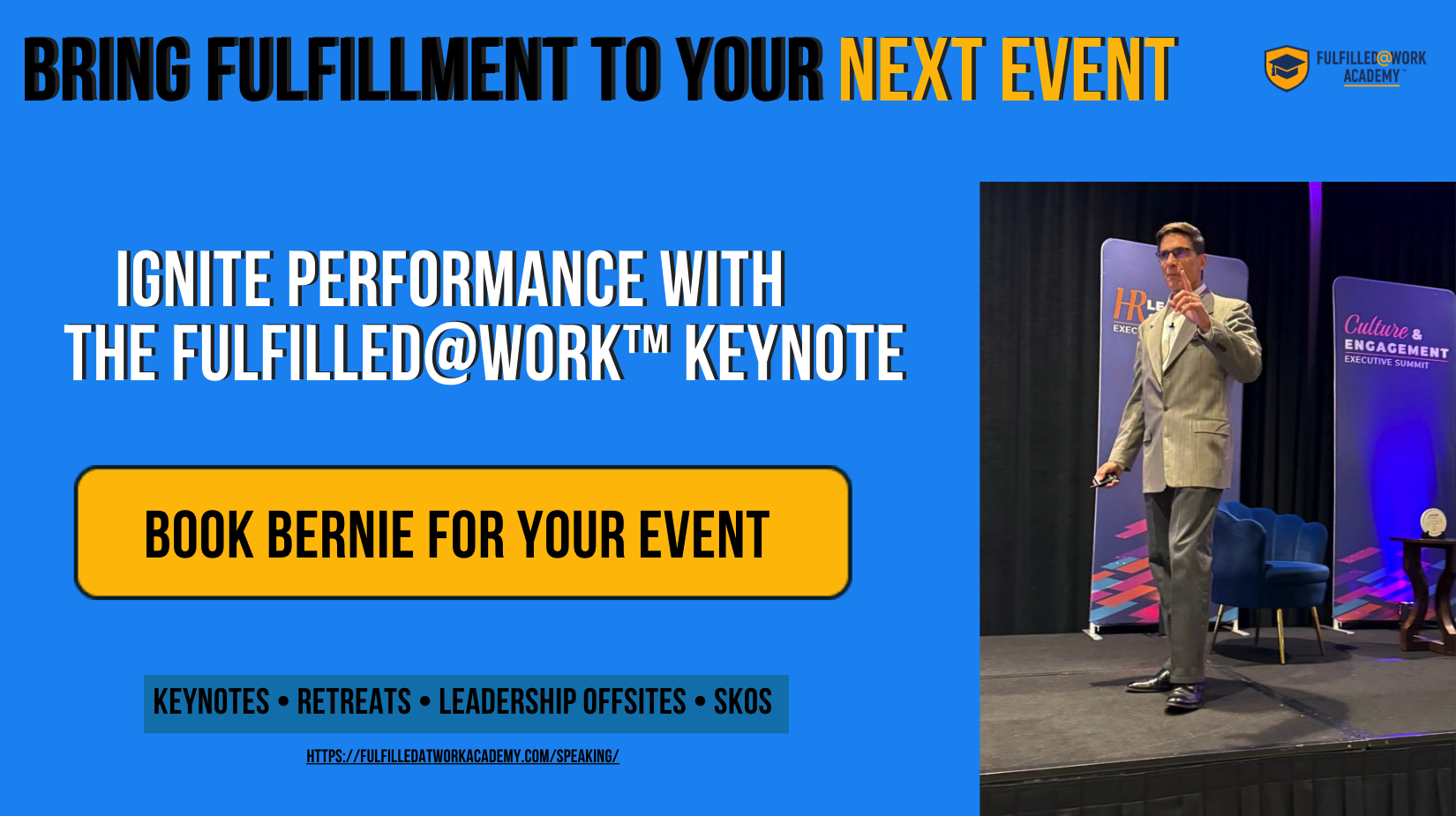Bernie Borges [00:00:00]:
This is Bernie Borges, host of the Life Fulfilled podcast. And this is episode two of three in a three part series that I’m doing on quiet quitting. In the previous episode, I explained what quiet quitting is. I shared some horrendous and real statistics about the impact of quiet quitting. And I ranted that some leaders either aren’t aware of the extent of quiet quitting in their teams when which shocks me, or they know about it and they just choose not to address it for whatever reason. In this episode, I want to go a little deeper on the connection between fulfillment and quiet quitting and some ideas on how to address it. And I’ll do that from two perspectives. One is from the perspective of the employee who is quietly quitting, and the other perspective is from the lens of the leader.
Bernie Borges [00:00:55]:
Let’s begin with what it means to experience fulfillment. Because it isn’t about having it all. That’s a pipe dream. It’s about alignment. The alignment between your values and your reality. Think of it like a car. When your wheels are out of alignment, the whole ride feels off. Same with work.
Bernie Borges [00:01:18]:
When your values and your role don’t line up, you feel resistance, even if everything else seems fine on the surface. In the context of quiet quitting, being fulfilled at work means that your work feels like an expression of you, not a drain on you. Let that sink in. Your work can be an expression of you. You see, when fulfillment is intact at work, you bring energy and enthusiasm. You care, you feel valued. You feel that what you do has meaning. Leaders, your fulfilled team members, go the extra mile to maximize results.
Bernie Borges [00:02:03]:
They volunteer to start new initiatives. They collaborate well with each other, they resolve conflicts on their own, and they take pride in their work, even when others get credit for good work. Now, these engaged scenarios that I just described, they exist in some workplaces. But the statistics from Gallup that I shared on the previous episode suggest that these scenarios are the exception and not the norm. So what can you do to experience fulfillment at work which inherently reduces quiet quitting? Well, first I’ll address this from the individual employee’s perspective. And if you’re self employed, then just reframe this for yourself. If you’re quietly quitting, you probably didn’t start out that way. You probably started with some level of hope or enthusiasm about your work.
Bernie Borges [00:03:00]:
You might have thought, hey, this role is a good opportunity, or this company seems like a good fit. But over time, something changed. Maybe your ideas were ignored, maybe you stopped getting feedback, or maybe you realized that no one was really paying attention to your effort. So you started to pull back. Whatever the circumstance, it is what it is and it’s reality. Just know that you’re not broken, but you are at a fork in the road. The good news is that you don’t need a total career change to start feeling fulfilled again. You don’t need a new boss or a new company to reclaim your energy now.
Bernie Borges [00:03:45]:
Maybe you do. But before you conclude that, consider that maybe what you need is curiosity and a small dose of courage. So let’s revisit the approach that I described in the previous episode with these three questions to ask yourself. 1. What used to give me energy at work? What part of my role do I or did I actually enjoy or find interesting? And then ask, what am I missing that I need more of? Now look, don’t overcomplicate this. Write down your answers to these questions. Let the answers flow without any intervention or judgment. Answering these questions may not solve everything overnight, but they’ll start to reconnect you to yourself.
Bernie Borges [00:04:40]:
And that’s the first step toward fulfillment at work. You can’t fix something if you don’t know it’s broken. Next, try something small, something that stretches you just a little. For example, volunteer for a new project or task. Ask for a one on one with your manager to talk about what your career growth can look like. And by the way, if your manager is willing, ask him or her about their own career growth goals. That flips the script and shows that leadership is a two way street. You might learn something very influential to your relationship.
Bernie Borges [00:05:22]:
You can offer to help a colleague in a way that uses your strengths. Now these are what I call micro moves. They’re small actions that send a big message to your brain and to your heart that say I still care. And look, I get it. You might be thinking why should I go the extra mile if no one notices? It’s a fair question. But you know, this isn’t about getting noticed. It’s about how you feel when you’re engaged, when you stretch, when you take a little ownership of your experience at work. Because that’s where fulfillment lives.
Bernie Borges [00:06:01]:
I mentioned in the previous episode that if you view your work as nothing more than a paycheck, I’m not here to judge you. But the danger is that you place a limitation on yourself if you think that work can’t be fulfilling at all because it’s only a paycheck to you. Remember, fulfillment doesn’t show up because someone handed it to you. Sometimes you have to create it from the inside out. If you’re willing, and that’s up to you. Now, if your workplace is truly toxic or your values are completely misaligned with your company’s, that’s another conversation. But most of the time, quiet quitting is reversible. You just need a spark.
Bernie Borges [00:06:49]:
And that spark often starts with awareness, followed by one small step. So if you’re the employee who’s been on autopilot, who’s been doing just enough to get by, I want you to know this. You are not alone. And you don’t have to stay on autopilot. Fulfillment is still on the table. You just have to be willing to reach for it. All right? That’s what it can look like from the employee side. Now, let’s flip the mirror.
Bernie Borges [00:07:19]:
Because if you’re a leader, you have a different kind of opportunity and actually a bigger responsibility. When a member of your team is experiencing quiet quitting, it’s rarely because they just woke up one day and decided to stop caring. It usually starts with small signals or often invisible. Maybe they stop speaking up in meetings. Maybe they do less follow up with colleagues. Or maybe they used to go the extra mile and now they just walk to the corner and back. That’s a metaphor, in case it wasn’t obvious. Anyway, these are signs that something is misaligned.
Bernie Borges [00:07:59]:
And as a leader, your job isn’t to judge. Your job is to listen, to check in, and to create a space where your people feel safe enough to talk about what’s missing. Now, let me give you a real stat that might wake you up if you’re not already paying attention. Gallup says that 70% of team engagement is directly tied to the behavior of the manager. 70%. Think about that. That means that as a leader, the way you show up, the way you listen, the way you lead, it shapes how engaged your team feels. If you’re disengaged, chances are your team is, too.
Bernie Borges [00:08:45]:
And if you’re not investing in their fulfillment, they might already be halfway out the door. Maybe not literally, but emotionally. And let me say this. Fulfillment at work is not about pizza parties or gift cards. It’s about making people feel seen, heard, and valued. It’s about giving them clarity in their role, a sense of purpose in what they do, and a viable path to grow. Even if that growth doesn’t mean a promotion right away. Personal growth can be as meaningful to someone as professional growth.
Bernie Borges [00:09:21]:
Let me give you an example. I once worked with a leader whose team had some of the lowest engagement scores in their division. When we dug into the data, the employees weren’t complaining about pay or perks. They felt like their work didn’t matter. They didn’t understand how their efforts contributed to anything beyond the next deadline. Once the leader started having intentional one on one conversations each week, just 15 minutes or so, things started to shift. The conversations weren’t performance reviews. They were authentic check ins.
Bernie Borges [00:10:00]:
What’s giving you energy right now? What’s frustrating you? Where do you want to grow? Simple questions like this. But they unlocked powerful responses, powerful insights. And within a quarter, that team saw a noticeable improvement in collaboration, accountability, and yes, in performance. Now, I’m not saying that fulfillment is a magic wand, but I am saying that when people feel fulfilled at work, quiet quitting abates maybe not to zero, but to a good degree, that yields measurable improvement. Because people don’t quietly quit when they feel connected. In fact, they lean in. So whether you’re a leader or an individual contributor, here’s what I want you to take away from this episode. Fulfillment isn’t a luxury.
Bernie Borges [00:10:56]:
Fulfillment is connected to achievement and purpose. When you experience fulfillment at work, you’re motivated to do your best work. And when fulfillment is missing, quiet quitting is almost inevitable. In fact, I’m tempted to say that the correlation between fulfillment and quiet quitting is formulaic. Now here’s some good news. Fulfillment is within reach. It starts with awareness, with reflection, with asking the right questions and taking small but meaningful actions. Whether it’s a leader starting real conversations with their team or an employee raising their hand to try something new, there’s always a step forward.
Bernie Borges [00:11:43]:
And that brings me to your next step. If you haven’t already taken the Fulfilled at Work scorecard, what are you waiting for? It’s free and it only takes about two minutes, and it gives you a score across five dimensions of fulfillment at work. It’s designed to help you see where you’re thriving and where you might be sliding toward quiet quitting, even if you don’t realize it yet. Now, you’ll find that at my website at fulfilled@workacademy.com or of course, right here in the show notes for this episode. And if you’re a leader, or even if you’re just trying to influence change in your workplace, let’s have a conversation. I offer a complimentary strategy call where we can look at your situation together. No pressure, just an honest conversation about where fulfillment might be missing and what you can do to turn things around. In the next episode, the third and final part of this series, I’m going to look at the bigger picture.
Bernie Borges [00:12:41]:
We’ll explore what quiet quitting costs, your culture, and how teams and organizations can address it from the inside out. You don’t want to miss that one. Until then, this is Bernie Borges, host of the Life Fulfilled podcast and founder of the Fulfilled at Work Academy. Thanks for being here. And remember, fulfillment is not a someday thing. It’s a right now thing. Let’s make it happen.





